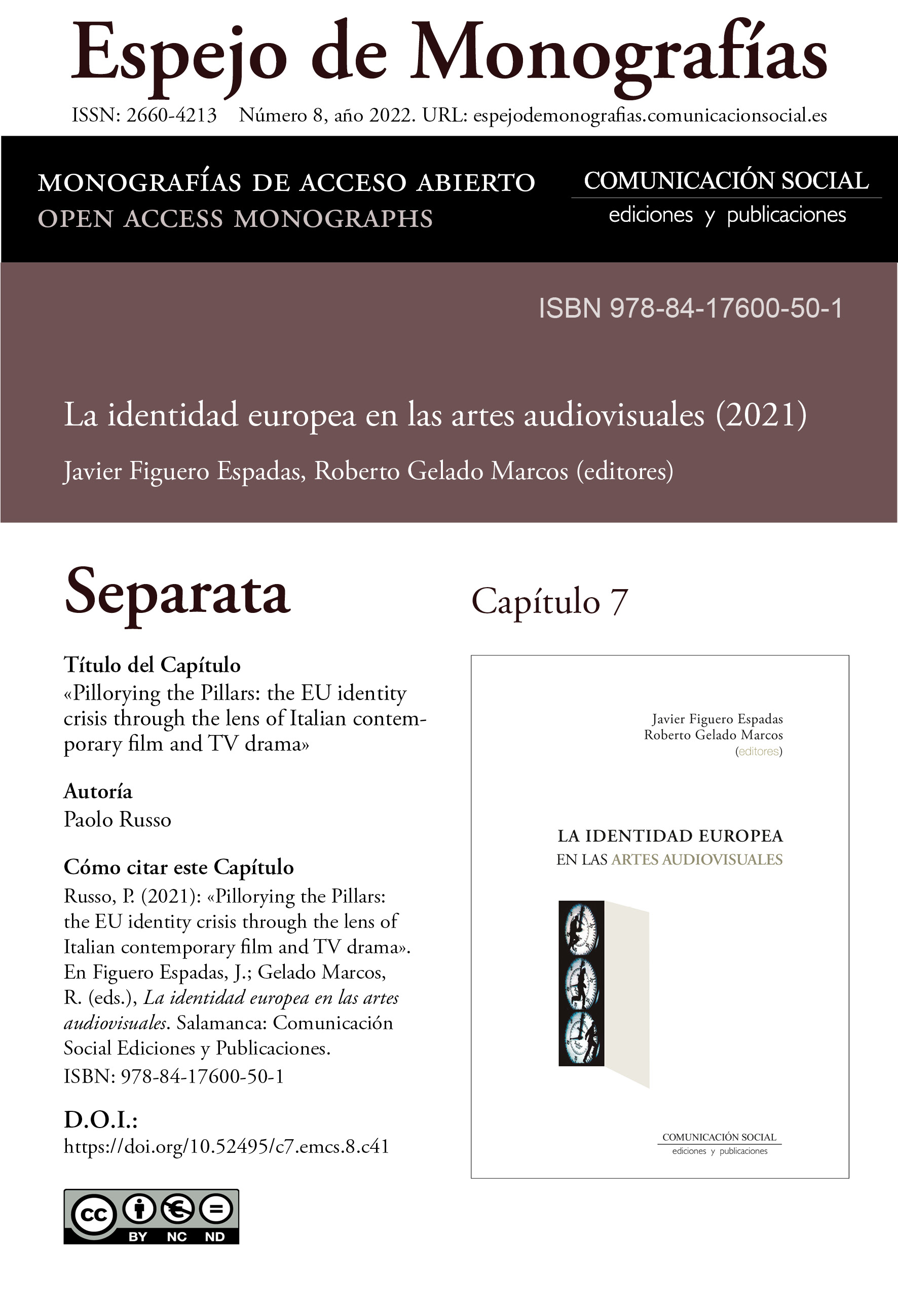Capítulo 7. Pillorying the Pillars: the EU identity crisis through the lens of Italian contemporary film and TV drama
DOI:
https://doi.org/10.52495/c7.emcs.8.c41Resumen
This chapter investigates screen representations of migrants in Italian productions over the last two decades through a methodological blend of textual analysis and statistical analysis of select hard data.
A representative sample of feature films (Saimir, Good morning Aman, La desconocida, Cover Boy, Mar Nero, Francesca, Terraferma, Fuego en el mar) reveals a balance between narratives of clash and encounter between cultures while highlighting the frequency of the victim paradigm almost always through a vision ab intra that, in most cases, carries a symbolic function of condemnation of a social issue (be it racism or injustice) and of promoting integration in the form of compassionate realism.
However, a detailed analysis of audience numbers and box office records (both in Italy and in other European markets such as Spain) also reveals the low impact and public outreach of these films. The real paradigm shift in the past two decades has been from film to serial television, which has become capable of attracting audiences of millions and multiplying exports.
Thus, the second part of the chapter will argue how, through a distinctive blending and dramatization of true facts and fiction, series like Gomorra, Suburra and El Comisario Montalbano push beyond traditional stereotypes and can be seen as paradigmatic of the crisis of the European Identity as a result of the failure (by Italian and EU institutions alike) to keep true to the so-called Pillars that the European entity has set itself.
Palabras clave: EU Pillars, Migration/migrants, Italy, Feature film, TV serial drama, Audience outreach.
Descargas
Citas
AAIS/AATI Conference (2020): «Exploring identity/identities: Naples beyond Gomorra & Elena Ferrante», Call for papers.
Abbate, Lirio (2016): «Massimo Carminati: ‘Tornerò da re a Roma’», L’Espresso (26-9-16). <https://espresso.repubblica.it/attualita/2016/09/26/news/massimo-carminati-tornero-da-re-a-roma-1.284232/>.
Amelio, Gianni (1994): Lamerica, Alia Film-Cecchi Gori Group Tiger Cinematografica-Arena Films-Rai 1-Canal+-Vega Film.
Amiri, Aluk; Dera, Hamed; Dilara, Hevi; Ali, Zakaria Mohamed; Yimer, Dagmawi (2012): Benvenuti in Italia, Archivio delle Memorie Migranti.
Amoroso, Carmine (2006): Cover Boy: L’ultima rivoluzione, Paco Cinematografica-Filand.
Andreasen, Marie; Cecchini, Leonardo (2017): «From passive victimhood to committed citizenship», in Discursive Framings of Human Rights. Negotiating Agency and Victimhood, Simonsen, Karen-Margrethe; Ross Kjaergard, Jonas (eds.), New York: Routledge, pp. 94-113.
Anon (2015): «Isis, allarme del ministro libico: ‘Terroristi arrivano in Italia sui barconi dei migranti’», Il Mattino (12-5-2015). <https://www.ilmattino.it/primopiano/esteri/isis_terroristi_arrivano_barconi_migranti_ministro_libico_allarme-1030904.html>
Anon (2018): «Allarme di Minniti e al-Serraj: ‘Combattenti Isis in fuga potrebbero arrivare in Europa con i barconi dei migranti’», La Repubblica (3-5-2018). <https://www.repubblica.it/cronaca/2018/05/03/news/minniti_isis_migranti_tripoli_al_sarraj-195442817/>
Anon (2019): «‘Basta con la propaganda pro-migranti’: la puntata di Montalbano divide. Anche Salvini twitta», La Repubblica (11-2-2019). <https://www.repubblica.it/spettacoli/tv-radio/2019/02/11/news/montalbano_migranti_immigrazione_salvini_twitter-218898075/>
Bhabha, Homi K. (1994): The Location of Culture, London and New York: Routledge.
Destination Italy: «Italian cinema and immigration database», [online] <https://www.mod-langs.ox.ac.uk/mml_apps/italian_movies/index.php>
Di Giuseppe, Nico (2015): «I terroristi dell’Isis nascosti sui barconi dei migranti», Il Giornale (17-5-2015). <https://www.ilgiornale.it/news/mondo/i-terroristi-dellisis-nascosti-sui-barconi-dei-migranti-1129411.html>
Graceffo, Germana (2008): «Pescatori d’uomini (Italia, 2007-2008)», Storie migranti. <http://www.storiemigranti.org/spip.php?rubrique47>
Hirsch, Marianne (2008): «The Generation of Postmemory», Poetics Today, vol. 29., núm. 1, pp. 103-128.
Ippolito, Valentina (2019): Lo sguardo dialogico: il viaggio migratorio in Italia nel cinema contemporaneo italiano e romeno (PhD thesis), Oxford, University of Oxford.
ISTAT: «Stranieri residenti al 1 gennaio – Cittadinanza». <http://dati.istat.it/Index.aspx?DataSetCode=DCIS_POPSTRRES1>
Lagios, Thanasis; Lekka, Vasia; Panoutsopoulos, Grigoris (2018): Borders, Bodies and Narratives of Crisis in Europe, Cham (Switzerland): Palgrave Macmillan.
Legnani, Matteo (2019): «Montalbano contro Matteo Salvini, la puntata pro-immigrati che scatena il caos in Rai», Libero (31-1-2019) <https://www.liberoquotidiano.it/news/spettacoli/13425114/montalbano-contro-matteo-salvini-fiction-immigrati-rai.html>
Mittell, Jason (2015): Complex TV. The Poetics of Contemporary Television Storytelling, New York: New York University Press.
Russo, Paolo (2018): «(The Facts Before) The Fiction Before the Facts: Suburra from Novel (to Trial) to Feature to TV Serial», in True Event Adaptation: Scripting Real Lives, Thornley, Davinia (ed.), Cham: Palgrave Macmillan.
Russo, Paolo (2021): Interview with Laura Cotta Ramosino (4-3-2021).
Scalea, Daniele (2016): «A proposito dei terroristi sui barconi», The Huffington Post (19-7-2016). <https://www.huffingtonpost.it/daniele-scalea/terroristi-barconi-isis-_b_11603062.html>
Tondo, Lorenzo (2019): «Italy split by Inspector Montalbano’s pro-migrant message on TV», The Guardian (12-2-2019). <https://www.theguardian.com/world/2019/feb/12/tv-detective-inspector-montalbano-pro-migrant-message-divides-italy>

Descargas
Publicado
Cómo citar
Número
Sección
Licencia

Esta obra está bajo una licencia internacional Creative Commons Atribución-NoComercial 4.0.
Los artículos publicados en la revista se distribuyen con la Licencia Creative Commons Atribución-NoComercial-SinDerivadas 4.0 Internacional










